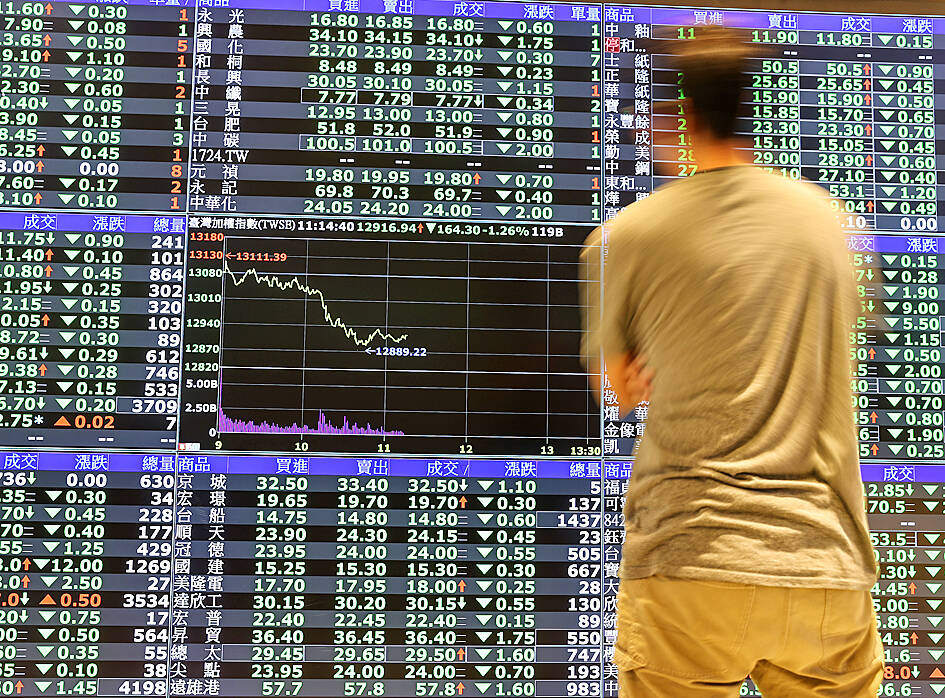The TAIEX yesterday closed at its lowest level in two years as investors cut their holdings ahead of the release of US inflation data, expected after press time last night, amid fears that the US Federal Reserve might turn even more hawkish.
Investors also remained cautious about the tech sector ahead of an investors’ conference by Taiwan Semiconductor Manufacturing Co (TSMC, 台積電).
The TAIEX lost 270.51 points, or 2.07 percent, to close at 12,810.73, the lowest level since Nov. 3, 2020, when the index closed at 12,736.01.

Photo: CNA
Turnover on the main board yesterday totaled NT$208.096 billion (US$6.5 billion), with foreign institutional investors selling a net NT$9.76 billion of shares, Taiwan Stock Exchange data showed.
“The market remains concerned by the rate hike cycle in the US, in particular as Washington will release its CPI [consumer price index] numbers later in the day,” Mega International Investment Services Corp (兆豐國際投顧) analyst Alex Huang (黃國偉) said.
“Investors fear the September CPI data will present a shock. For now, many investors have trimmed their positions to prevent further losses if the persistent inflation drives the Fed to raise its key interest rates by an additional 75 basis points in November, with another round of hikes in December,” Huang said.
The electronics sector fell 1.40 percent, with the semiconductor subindex losing 1.24 percent.
“Market attention was still focused on TSMC, which will provide guidance for the fourth quarter, as concerns are growing that the export ban will exacerbate current inventory adjustments,” he said.
TSMC fell 0.63 percent to close at NT$395 after failing to sustain its earlier gains.
The chipmaker reported in an investors’ conference that its earnings per share for the third quarter hit a new high of NT$10.83.
Selling also rotated to old-economy stocks yesterday. "At a time of aggressive rate hikes by the Fed and other major central banks in the world, concerns over the impact on the global economy and demand are deepening," Huang said.
The petrochemical sector fell 2.97 percent, with Formosa Petrochemical Corp (台塑石化) falling 3.33 percent, Formosa Plastics Corp (台塑) dropping 2.35 percent, Nan Ya Plastics Corp (南亞塑膠) losing 2 percent and Formosa Chemicals & Fibre Corp (台灣化纖) falling 1.95 percent.
The tourism sector plunged 3.89 percent, even though Taiwan reopened its borders to international travelers yesterday.
“The border reopening was already priced in, while investors heeded inflationary concerns and locked in their gains,” Huang said.
Phoenix Tours International Inc (鳳凰國際) plunged 10 percent and Lion Travel Service Corp (雄獅旅行社) fell 8.14 percent, while Formosa International Hotels Corp (晶華國際酒店) lost 2.36 percent.

BYPASSING CHINA TARIFFS: In the first five months of this year, Foxconn sent US$4.4bn of iPhones to the US from India, compared with US$3.7bn in the whole of last year Nearly all the iPhones exported by Foxconn Technology Group (富士康科技集團) from India went to the US between March and last month, customs data showed, far above last year’s average of 50 percent and a clear sign of Apple Inc’s efforts to bypass high US tariffs imposed on China. The numbers, being reported by Reuters for the first time, show that Apple has realigned its India exports to almost exclusively serve the US market, when previously the devices were more widely distributed to nations including the Netherlands and the Czech Republic. During March to last month, Foxconn, known as Hon Hai Precision Industry

Taiwan Semiconductor Manufacturing Co (TSMC, 台積電) and the University of Tokyo (UTokyo) yesterday announced the launch of the TSMC-UTokyo Lab to promote advanced semiconductor research, education and talent development. The lab is TSMC’s first laboratory collaboration with a university outside Taiwan, the company said in a statement. The lab would leverage “the extensive knowledge, experience, and creativity” of both institutions, the company said. It is located in the Asano Section of UTokyo’s Hongo, Tokyo, campus and would be managed by UTokyo faculty, guided by directors from UTokyo and TSMC, the company said. TSMC began working with UTokyo in 2019, resulting in 21 research projects,

Taiwan’s property market is entering a freeze, with mortgage activity across the nation’s six largest cities plummeting in the first quarter, H&B Realty Co (住商不動產) said yesterday, citing mounting pressure on housing demand amid tighter lending rules and regulatory curbs. Mortgage applications in Taipei, New Taipei City, Taoyuan, Taichung, Tainan and Kaohsiung totaled 28,078 from January to March, a sharp 36.3 percent decline from 44,082 in the same period last year, the nation’s largest real-estate brokerage by franchise said, citing data from the Joint Credit Information Center (JCIC, 聯徵中心). “The simultaneous decline across all six cities reflects just how drastically the market

Ashton Hall’s morning routine involves dunking his head in iced Saratoga Spring Water. For the company that sells the bottled water — Hall’s brand of choice for drinking, brushing his teeth and submerging himself — that is fantastic news. “We’re so thankful to this incredible fitness influencer called Ashton Hall,” Saratoga owner Primo Brands Corp’s CEO Robbert Rietbroek said on an earnings call after Hall’s morning routine video went viral. “He really helped put our brand on the map.” Primo Brands, which was not affiliated with Hall when he made his video, is among the increasing number of companies benefiting from influencer